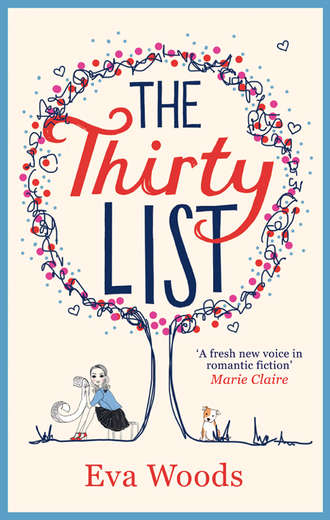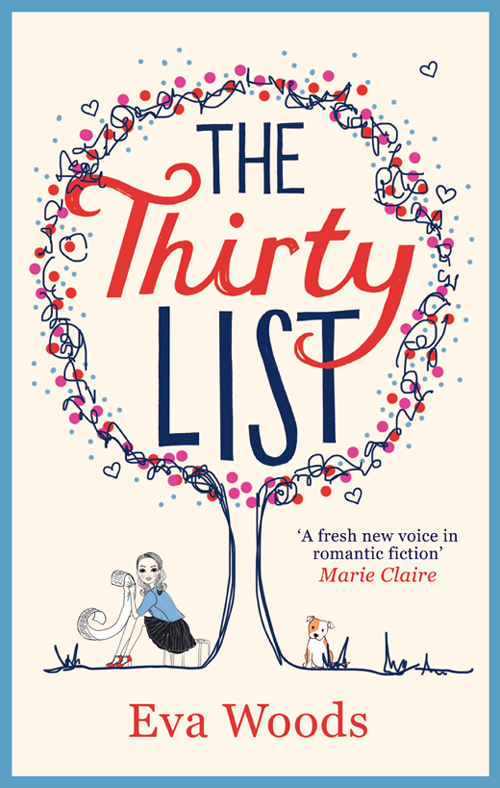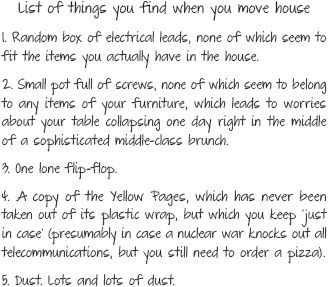
Полная версия
The Thirty List


EVA WOODS grew up in Ireland and lives in London, where she writes and teaches creative writing. She likes wine, pop music and holidays. And she thinks that online dating is like the worst board game ever invented. This is her first romantic comedy.


www.millsandboon.co.uk
To Alexandra Turner,
my favourite primary-school teacher
Table of Contents
Cover
About the Author
Title Page
Dedication
Prologue
Chapter One
Chapter Two
Chapter Three
Chapter Four
Chapter Five
Chapter Six
Chapter Seven
Chapter Eight
Chapter Nine
Chapter Ten
Chapter Eleven
Chapter Twelve
Chapter Thirteen
Chapter Fourteen
Chapter Fifteen
Chapter Sixteen
Chapter Seventeen
Chapter Eighteen
Chapter Nineteen
Chapter Twenty
Chapter Twenty-One
Chapter Twenty-Two
Chapter Twenty-Three
Chapter Twenty-Four
Chapter Twenty-Five
Chapter Twenty-Six
Chapter Twenty-Seven
Chapter Twenty-Eight
Chapter Twenty-Nine
Chapter Thirty
Chapter Thirty-One
Chapter Thirty-Two
Chapter Thirty-Three
Chapter Thirty-Four
Chapter Thirty-Five
Chapter Thirty-Six
Chapter Thirty-Seven
Epilogue
ACKNOWLEDGEMENTS
Endpages
Copyright
Prologue
If you believe the films, there should be a moment in life when it all comes together. When you’ve got everything you ever wanted, and your happy ending is here. The music is swelling. Everyone’s smiling at you.
Well, this was mine. This was my happy ending. And I was more terrified than I’d ever been in my life.
Beside me in the portico of the church, Dad was nervously tying and retying his cravat, ready for the short walk we were about to undertake. It was only thirty seconds, tops. But once it was over, nothing would be the same again. I’d be married to Dan. I’d be someone’s wife.
‘All right, Muffin?’
‘Just a bit … you know.’
‘Nervous?’ In fact, I was frozen in terror, unable to move my vintage-style Mary Janes a single step forward. ‘I don’t blame you. All those eyes looking at you.’ He shuddered. ‘It’s just like my recurring nightmare about being on Countdown and only able to make three-letter words.’
‘Yes, it’s exactly like that.’
‘Except I’ve got my clothes on in this one.’
‘Thanks, Dad.’ Inside the door of the church, the organ was already playing. I hadn’t wanted it—we weren’t religious, but it meant a lot to Dan’s family. I could see his mum, her enormous hat dominating the front row, and his dad looking frail, leaning on a walking stick. He’d had a stroke the month before and was still wobbly. I’d suggested we postpone the wedding, but Dan wouldn’t hear of it.
I clutched my posy of freesias, which was leaking water onto my ballet-length lace dress. My veil was snarled around my face, making me breathless. ‘Dad?’
‘Yes, Muffin?’
‘How do you know? I mean, how can you be sure? About the person you marry?’
‘Eh …’ He looked deeply uncomfortable, and not just because his tie was cutting into his neck. ‘You just meet someone, and you like them, and you make it work somehow. It isn’t hard. Not like Countdown.’
‘But at least Countdown has rules.’
‘You are … fond of Dan?’
‘Of course! Of course. We’re very happy.’ Eight years with barely a row, sliding easily into dating, cohabitation and now marriage. Of course we were happy. We’d even bought a house, in Surrey. After the wedding we’d be packing up and leaving Hackney with the police sirens and falafel joints and shop downstairs that still sold Panini stickers from the 2002 World Cup. Dan had casually suggested it a few months ago, right in the middle of wedding planning. There’d be more space, less crime, a garden. All those things you were supposed to want. I’d already given notice at my job in the cool little design agency above a tattoo parlour in Shoreditch.
‘Muffin,’ said Dad, growing alarmed at my failure to move. ‘We have to go in. Everyone’s waiting. Unless you …’
‘I’m fine! Fine! I’m just nervous!’ Through the crack in the doors, I could see eyes begin to turn, murmurs going up. Looking for me. At the front of the church, my sister, Jess, and my best friends, Emma and Cynthia, were already waiting in their lavender prom dresses. Jess as usual looked stunning. The vicar, a friend of Dan’s family, was in place. This was it, my moment. Just waiting for me to move forward.
Gently, Dad took my arm. ‘Come on, Muffy. You don’t want to go back, do you, call it all off? Because if you do …’
‘No!’ I loved Dan. We had a whole life together. I remembered what he’d said to me yesterday, before he went to sleep at his parents: ‘I’ll never leave you, Rachel. I promise we’ll always be together.’ He’d even stroked my face, although it was encrusted in an avocado skin mask.
‘Even if I look like this?’
He’d smiled. ‘You always look good to me.’
Dad patted my hand. ‘Well, if you can’t go back, you have to go forward. Your time’s up, Muffy.’ He began to hum the Countdown theme tune. ‘Do do-do do-do …’
‘OK, OK. I’m ready.’
‘You know what marriage is, Muffy?’
‘A nine-letter word?’
‘It’s eight letters, Muffs. Honestly, Maths never was your strong point. Anyway, it’s not a word. It’s a sentence.’
‘Um, that’s not helpful.’
‘What I mean is, it’s a beginning. It’s not an end.’
Far down at the end of the aisle, I could see the back of Dan’s head, his ears slightly red with the pressure of eyes watching him, his arms crossed in front of his dove-grey morning suit. I thought of our life together, our new house, our friends, our families. This was right. This was what you were supposed to do. I took a deep breath. ‘OK, Dad. Let’s do it.’
‘Excellent. Consonant, please, Carol!’
The music changed. The doors opened. I started to move forward.
Chapter One
Two years later
Things that suck about divorce, number three: at the exact moment your life has hit rock bottom, and all you need is a particular inspiring tune to lift your spirits and provide guidance and cheer, you can’t find the CD you want because your ex-husband, your soon-to-be ex-husband, has moved it and you can’t ask him where it is, because, you know, you’re getting divorced and it probably isn’t very high up his list of concerns.
I was lying on the floor on my stomach, feeling under the shelving unit we use—used—to keep CDs in. Where the bloody hell was it? Why would he take the KT Tunstall CD? KT Bumstall, he called her.
When my friends came back into the room, staggering under boxes, they found me still on the floor, weeping and trying to hum my own jaunty backing track in a voice choked with tears, dust and the two-bottles-of-Chardonnay hangover I was nursing from the night before.
‘Rach! What is it now? Did you find another one of his socks? Did you listen to your wedding first-dance song?’ Emma rushed over, dropping her box into Cynthia’s awkward embrace.
‘Careful, Em! That’s the Le Creuset in there! You could have crippled me.’
I was babbling. ‘KT … Can’t find it … Need the song!’
‘What song?’
‘That one!’ In the depths of my grief, I couldn’t remember the name of it. ‘The makeover montage song. From The Devil Wears Prada. You know, the one that goes—do do do-do do-do-do. I need it! So I can walk along in great shoes and get a dream job and nice clothes, even if my boss is mean to me, and everything will be OK!’
Emma and Cynthia exchanged a look, then Cynthia took out her iPhone and pressed some buttons. ‘Do you mean this one?’ ‘Suddenly I See’ began to play out of the phone, slightly tinny.
I was still crying. ‘This is rock bottom! I need to listen to this song and then feel better and walk along in my heels. You see?’
‘You aren’t wearing heels, darling,’ said Cynthia kindly. ‘You think they’re tools of patriarchal oppression, remember?’
On my feet were mud-encrusted purple welly boots, which I had donned for uprooting some of the plants I’d grown in the garden, thinking I might pack them in a box and take them with me, before realising this was crazy, as I had nowhere to live, let alone a garden. That’s what you do when you’re getting divorced. You go crazy. I started crying again. ‘I know! I don’t even have any heels! Everything is awful!’
Emma and Cynthia had a quick muttered eye-rolling chat, and then Emma called out to me in a ‘talking to a mad person’ voice: ‘Look! We’re walking for you, love!’ They were marching up and down my soon-to-be-ex living room on the exposed wooden floor, Emma in sensible walking shoes and Cynthia in expensive brown knee boots.
We had noticed several subtle changes in Emma’s character since she became a primary school teacher: one, an exponential increase in bossiness; two, a habit of asking did we want to go to the toilet before we went anywhere; and three, the total loss of any physical shame. Now she was prancing about the floor, accompanied by an eye-rolling Cynthia, who gamely waved her long limbs about, then broke off as the song stopped and her phone rang. ‘Cynthia Eagleton. No, for Christ’s sake, I said send them out already. Listen, Barry, this is a serious question—what do you mean that’s not your name? Never mind, I’m going to call you Barry. Can you not do anything for yourself? How do you manage to get out of bed in the morning? Just get it done.’ She hung up, sighing. ‘I swear it’s a miracle he can even blow his own nose, that boy.’
‘Was it hard for you to get a day off?’ I mumbled dustily.
‘Only about as hard as it was for Richard Attenborough and his mates to get out of that prison camp. But don’t worry, darling. I’m here to help. Barry, or whatever his name is, will just have to learn to tie his own shoelaces.’ Cynthia’s had a lot to contend with in life. Not just the fact her mum saw fit to call her Cynthia—there was some great-aunt’s will involved—but also the fact she was ten years older than her siblings, and the only one to be fathered by her mum’s first love, who’d been deported back to Jamaica before Cynthia was even born. Still, she’d clawed her way up to a top legal job, she strikes terror into the hearts of her colleagues and she does have really nice hair.
Emma looked down at me kindly. ‘It’s good you want to listen to this song, you know. You’re done with all that R.E.M., then? Sixteen renditions of “Everybody Hurts” in a row?’
‘Not sure,’ I mumbled into the floor.
‘Well, you’ll have to be, because I’ve buried the CD in the garden and I’m not telling you where.’
‘Oh.’
‘Do you want to get up now?’
‘Not really.’
‘Come on, love. I’ll give you a sticker.’
So this was me, Rachel Kenny, aged thirty, imminently to be divorced, having to be prised away from my hardwood floors, my back-garden hydrangea and my wind chimes and exposed-brick chimney piece. All those things I barely looked at but saw every day, and which were mine. I had floor dust down my front and was wearing an old college sweatshirt, partly because everything was packed, and partly because I had owned it before I met Dan, and I wanted to try to reset to that person.
This was the kind of crazy logic I was operating on at this moment in time. Things that suck about divorce, number seven: you go completely and totally out of your tree.
Finally, after two emergency trips back for things I’d forgotten that seemed really important at the time (hairbrush, muffin tray, mop), we were in the van Emma had hired me.
‘Ready?’ Cynthia asked me, settling into the wide front seat.
‘I don’t know. It’s … My whole life was there. I don’t know what I’m going to do now.’
She squeezed my arm with her manicured hand. ‘I know, darling. But what’s that thing your dad always says?’
‘Um … Countdown’s never been the same since Carol left?’
‘No, I mean that other thing. If you can’t go back, you have to go forward.’
I stared back at the house. Dan would be coming back later. I didn’t even know where he’d been staying while I moved my things out. This was what we’d come to. ‘Do you think I should leave him a note? I mean, I can’t just … go. That can’t be the last conversation we ever have. We were together for ten years!’
They exchanged another look. ‘We’ve talked about this, Rach,’ said Emma gently. ‘I know it’s hard, but this is just how it has to be.’
We drove off. The house receded in the mirror to the size of a Lego cottage, till I almost felt I could pick it up and pop it into the pocket of my hoody, and then I couldn’t see any more anyway because of the tears filling my eyes, spilling out and running down onto my dust-stained front. Cynthia passed me a flowery tissue and Emma patted my hand as she cut up school-run mums in massive Jeeps. I closed my eyes.
Things that suck about divorce, number nine: moving out of the home you spent years creating, with nowhere else to go. And remembering halfway up the M3 that you left the KT Tunstall CD in the car, which was no longer yours, along with all the rest of your life.

I cried four times on the journey from Surrey to London. One was in the forecourt of a garage while Emma filled up (Cynthia refused to get petrol on her green leather driving gloves). Dan and I had done a lot of driving when we first got married and bought our car, a fourteen-year-old Mini. When we still had things to say to each other. We’d get the worst compilation CD we could find in the garage—Seventy Valentine’s Day Rockers! Fifty Smooth Driving Tunes!—and sing along, eating crisps, our hands touching in the greasy packet. I wondered if I’d now be sad every time I went to a garage for the rest of my life. It would make popping out for a Twix quite problematic.
One good thing about crying is it’s quite a useful way to pass the time, if you don’t mind chronic dehydration and people staring at you, so the journey went by for me in a blur of motorways, hiccuping sobs and love songs on Mellow Magic FM, and soon we were at Cynthia’s Chiswick-based palace. She has three storeys and even a garden you could swing several cats in.
We had stopped. The girls were looking at me, worried. I wiped my face, feeling like one of those criminals who needed to be bundled out of court in a blanket. You messed up your marriage, Rachel Kenny! Even though you had three Le Creuset pans and a fixed-rate mortgage! This court finds you guilty of being an idiot!
‘Come on, darling,’ said Cynthia. ‘Let’s get you down for the night.’
‘I’m not a baby, you know.’
‘Funny,’ Emma said, ‘because with all the crying and dribbling, it is actually quite like being with a baby.’
I gulped. ‘At least I still have bladder control. Unlike you that time with the Red Bull shots.’
Emma smiled and patted me on the hand. ‘That’s my girl. Don’t let the bastards grind you down.’
Cynthia actually had a spare room, with a bed and soft white sheets and a carafe of water on the bedside table, plus arcane things like armoires and runners that I’d only ever seen in design magazines. Once I was settled into bed for the night—completely shattered, all my stuff in archive boxes, with no idea where my toothbrush might be—my phone bleeped with a text. Dan? My heart did a sort of funny swoop and fall, guilt and sadness and something else all in one. But no, of course it wasn’t Dan. I doubted he would ever text me again. It was Emma, asking if I was OK. I didn’t know how to answer that, so instead I composed imaginary texts to Dan, supposing he were actually talking to me and might listen to what I had to say.
I’m sorry. I’m so, so sorry. Please let me come home.
I miss you.
I can’t do this on my own.
I didn’t send them, and for the rest of the night my phone stayed as dark and silent as the R.E.M. CD that was now buried somewhere under my bedding plants, ex–bedding plants, in a garden I’d probably never see again. I thought of him saying two years before: I’ll never leave you, Rachel.
Yeah, right. But then, neither of us had exactly kept the promises we made that day.
Chapter Two
When I woke up in Cynthia’s white-cotton-and-distressed-wood (why would it be distressed? It’s in a lovely house in Chiswick. I’ve never understood that phrase) spare room, I’d no idea where I was for a moment. Had I fallen asleep in a branch of the White Company? Then it all came back and I felt the first tears of the day push against my eyelids. None of that. Today I had to find somewhere to live. I got ready in the en suite, with its rainfall shower and roll-top bath (if I was very quiet, maybe I could just stay here forever) and dressed in jeans and Converse. I brushed my hair, as I had to appear like a normal functioning member of society today, and that was hard for me at the best of times.
Cynthia was at the scrubbed wood table with The Sunday Telegraph—she married a Tory; I know, but it can happen to your dearest friends sometimes—croissants and fresh coffee. Unlike how I’d have been on a Sunday in my own kitchen—toothpaste-encrusted jammies and butter in my hair—she was dressed in a grey wool dress and different, equally expensive knee boots. ‘There you are. Ready for the first day of the rest of your life?’
‘I thought that was yesterday.’
‘No, that was the last day of … a different bit of your life.’
‘Catchy.’
‘Croissant? Bagel? Scrambled eggs? Toast?’ Cynthia was one of those people who would hostess you to death if you let them.
‘Croissants would be lovely, thanks. Do you have any tea?’ It was tragically uncool, but I’d never learned to like coffee.
Cynthia found some PG Tips hidden shamefully in a cupboard, holding them away from her as if they were toxic waste, or a shopping bag from Lidl. ‘They must be the cleaner’s.’
Of course they had a cleaner.
She furnished me with tea, croissants, jam and bits of the paper. ‘What do you want to be depressed by? The stagnant house market, the rising price of ski holidays or the dangers of uncontrolled immigration?’
‘I’ll take immigration. I need a laugh. You know, you should get them to interview you. Young Tory lawyer who had a black immigrant dad. They’d choke on their crumpets.’
Oh dear. Maybe I shouldn’t have mentioned her dad. But she only said, ‘I’m not a Tory. I just married one. It could happen to anyone.’
‘Where is Rich, by the way?’ It was easy to forget someone else lived in this palace of white and sisal; he was so seldom there.
‘Went into the office.’
‘On a Sunday?’ Of course he did. I shouldn’t have asked. I might have been a lot poorer than most of my friends— if we were the UN, I’d be Yemen—but at least I could lie in bed and mope whenever I wanted to. You couldn’t put a price on that.
I was reading an article on house prices and feeling gloom settle over me. ‘I’ll never get on the property ladder again. There’s a cardboard box here for sale for a hundred grand. Apparently, it’s “bijou” and “compact” and made of “environmentally friendly materials”.’
‘You’re not off the ladder. You’ve just stepped away for a while, is all.’
‘Fell off, more like.’
‘Frank fell off a ladder once. Broke his leg in three places.’
That was me, I reflected gloomily. Fallen back to earth with a crash, while up above me everyone else just kept on climbing that damn ladder. It was like doing gymnastics in PE all over again. ‘How are your mum and Frank?’
‘Fine. Talking about joining the Caravan Club, so that’ll be nice and embarrassing for Rich’s parents when we have them over at Christmas. They think caravans are for stable hands and New Age travellers.’
I wondered again how Cynthia felt about the fact her dad had never tried to contact her. I’d known her as long as Emma, the three of us meeting in the first term at Bristol Uni, huddling together in a refuge against the posh girls with long blonde hair, ski outfits and double-barrelled names, but sometimes I still had no idea what she thought about things.
‘So you’re house-hunting today?’ she said.
‘Urgh. Yes. Nightmare.’
‘You can stay here as long as you like, you know that?’
‘Thank you. But I think me and my existential crisis need a room of our own.’
Cynthia dropped me off at the station in her BMW, pointing out helpfully where I had croissant flakes in my hair, and I began the first of my viewings.
Two years ago, when we were still congratulating ourselves on our good life decisions—getting married, eating five portions of fruit and veg a day, opening pensions—Dan and I had bought a semi in suburbia, which wasn’t much but had two bedrooms, a bathroom that wasn’t incubating new species of mould, and a small scrappy patch of grass where we sentimentally thought our children would play, and before that our border collie, or golden retriever; we hadn’t got that far yet. Remembering some of the places I’d lived before this, I dreaded flat-hunting.
Now, I like to think I’m a fairly positive person.
I mean, I’m not, not at all, but I like to think it, and I try to give what my Buddhist friend Sunita calls ‘a cosmic yes to the universe’. Spending the day flat-hunting in London is enough to make you give a giant no, no, no, and hell no to the universe, and crawl back into bed with the duvet over your head, reflecting on how you can’t really afford a bed, or even a duvet. My day went something like this:
The ‘sunny studio’ in Sydenham turned out to be one room with a single bed in a house share of five other people, one of whom showed me the room wearing just a pair of Y-fronts and a jokey rape-themed T-shirt. ‘You’re OK with parties, right? One house rule though is everyone, like, has their own stash. It’s just cooler that way.’ No.
The ‘quiet garret room’ in Blackheath was a single bed in an alcove off the living room of a nervy older lady.
‘There’s no door?’ I said, edging to the window. The place was where light came to die and there was a strong smell of cat pee.
‘Oh, no. The little ones don’t like to be shut out.’ She said this cooing at one of the three cats I had spotted so far, a black tom with a scar over one eye and a malevolent glare out of the other.
The bedcover was chintz, approximately forty years old, and as she showed me it, a different, ginger cat jumped off the wardrobe and raked its claws over my neck. ‘Oh, he likes you!’



